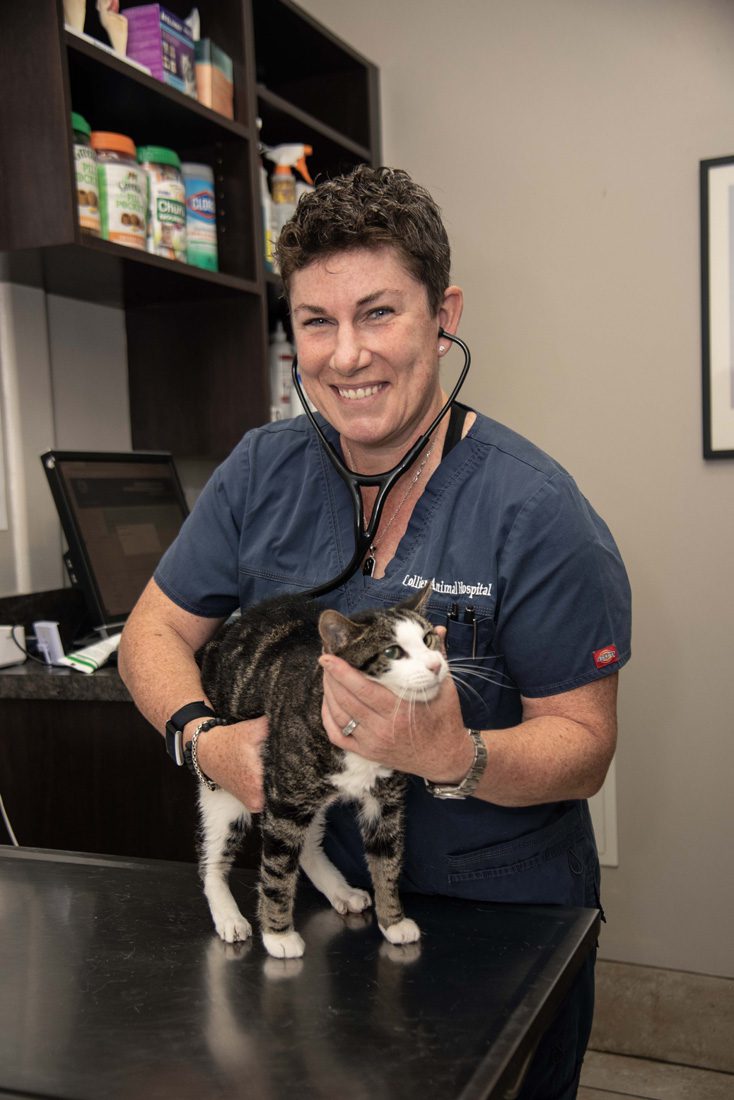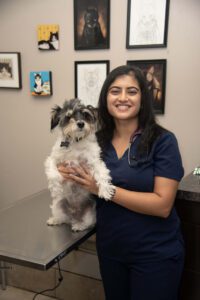All things considered to care for your furry friend!

Anyone lucky enough to have pets should know how important it is to take them to the vet for regular checkups. But even the more seasoned animal owners may not be aware of everything they need to know when it comes to their pet’s health. For instance, indoor cats need certain vaccinations, and puppies and kittens require more specialized care when they are at such a vulnerable age.
Dr. Shannon Ewing, veterinarian and owner of Collier Animal Hospital in Collier Hills, recommends bi-annual exams and explains that taking your pet to the vet every six months is the equivalent of a person going to see the doctor every three to four years. “A lot can change in that time frame,” she says.

Cat Care
You may think that because your kitty never leaves the house that she’s not as susceptible to the woes of outdoor cats, but indoor felines still need some annual vaccines, including the one that prevents rabies. This vaccine is also required by law in Georgia.
Ewing recommends that cats also receive the feline leukemia virus vaccine in their first year to ensure they build up antibodies while owners are deciding if they will be 100% indoors. She also explains that keeping a kitty inside is a safer lifestyle with less exposure to parasites, predators and cars.
Straight to the Heart
“Heartworms are transmitted by mosquitos, which are prevalent in the southern U.S.,” Ewing says. “Dogs and cats can serve as hosts for this parasite, and it is 100% preventable.”
According to Randi Schroedel, also a veterinarian at Collier Animal Hospital, it only takes one bite from an infected mosquito to transmit heartworms.
“Though dogs and cats cannot directly give heartworms to other animals, mosquitoes that bite an infected dog or cat can then transmit them to other unprotected pets in the area,” she says. “Therefore, all dogs and cats need to be on heart worm prevention.”
Dental Duty
Just like having a clean mouth is imperative for humans, this also rings true for dogs and cats. Pets can get gingivitis, tooth decay, infection and periodontal disease, which Ewing says can lead to problems with an animal’s heart, liver or kidneys.
Schroeder adds that while at-home dental care techniques for pets are important, those do not replace the need for professional cleanings and dental X-rays to evaluate root disease.
Detecting Discomfort
If your pet is doing anything out of the ordinary, such as hiding, acting lethargic or not eating, it’s important to take them to see a veterinarian. “Any change in behavior or routine events, like drinking more than usual, more or less urine production and changes in stool consistency, should warrant a vet visit,” Ewing says.
A good rule of thumb is to bring your pet to the vet for regular checkups, but if yours suffers from a chronic disease or condition, they may require additional care.
Little Blessings
Kittens and puppies need a little extra TLC during their first 16 weeks. According to Dr. Harshila Ballal, another veterinarian at Collier Animal Hospital, they need various vaccines every two to four weeks starting at six weeks of age. “We cannot predict when their mother’s immunity wears off and the vaccines can take over the responsibility, which is why we have to do several rounds,” she says.
COLLIER ANIMAL HOSPITAL
404.407.0200
collierah.com
PHOTOS: Joann Vitelli
Pets columnist at Simply Buckhead. Professional writer and editor. Proud animal rescue volunteer.












